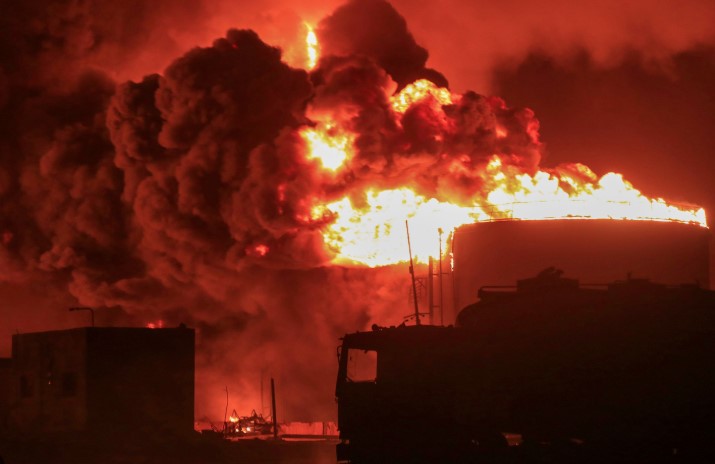In a dramatic escalation, the Israel Defense Forces (IDF) have confirmed a powerful airstrike that obliterated the Galaxy Leader, a commercial ship hijacked by Houthi forces in 2023. Hidden in plain sight at Yemen’s Ras Isa port, the vessel had been secretly transformed into a Houthi-controlled radar hub, tracking international shipping and threatening vital Red Sea trade routes. The IDF exposed the ship as a critical piece in the Houthis’ terror network, using it to destabilize the region and target Israel. The strike, part of the fierce Operation Black Flag, sent a clear, thunderous message across the battlefield.
IDF Hits Strategic Houthi Ports in Yemen During Operation Black Flag
The IDF launched Operation Black Flag to disrupt what it described as “terror infrastructure” that the Houthis use for missile and drone attacks.
The strikes targeted three major ports—Hodeidah, As-Salif, and Ras Isa—which the Houthis reportedly use to store weapons and organize logistics for their operations in the region. One of the additional targets was the Ras Khatib power station, a key facility in the area. Another important target was the Galaxy Leader, a ship that had been hijacked in the Red Sea in 2023. According to Israeli sources, the Houthis had repurposed the vessel for launching attacks.
Before beginning the strikes, the IDF broadcasted an urgent evacuation warning in Arabic, calling on all civilians in the targeted areas to leave immediately. This step was taken to avoid civilian casualties during the strikes.
After the attacks, footage from the region showed Houthi forces setting up checkpoints and ambulances rushing to the affected locations. The IDF targeted facilities that it believed the Houthis used for planning and coordination meetings.
IDF Strikes Syrian-Lebanese Border Crossing Used by Hezbollah
The Israeli defense ministry later stated that the operation strongly responded to continued Houthi missile fire and warned that Israel would respond with similar force to any further attacks.
Houthis Respond With Missile Fire; Sirens Echo Across Israeli Regions
In the early hours of Monday morning, just hours after the IDF strikes, the Houthis fired missiles at Israel in what appears to be a direct response to Operation Black Flag. People heard sirens warning of missile attacks in several regions, including the West Bank and the Dead Sea.
Israeli military officials said Houthi forces launched at least two missiles from Yemen targeting Israeli territory. Israeli defense systems intercepted one missile mid-air, and the second caused no damage. The attack did not injure anyone.
This new missile fire marks a renewal of Houthi attacks after a brief period of silence. Since the end of June, there had been a noticeable decrease in missile launches, which some linked to earlier Israeli operations that targeted Houthi military leadership. However, activity from the group appears to have resumed strongly in recent days.
IDF Arrests Two Syrians for Alleged Spying for Hezbollah in Demilitarized Zone
Just two days before this incident, a missile launched from Yemen had also triggered alarms in the Judean Desert and Dead Sea areas. That missile was also intercepted successfully without any reported harm.
The repeated missile launches highlight the ongoing tension between the Houthis and Israel, even in the presence of a broader ceasefire arrangement with Iran.
Rising Regional Tensions Despite Ceasefire: IDF Warns of Further Action
Despite a ceasefire that had reportedly taken effect in late June between regional players, the situation between Israel and the Houthis remains extremely tense. While there had been hopes of reduced hostilities, the latest actions on both sides have shown that conflict remains active and dangerous.
The IDF believes the earlier decrease in Houthi strikes may have been due to internal disruptions following a targeted Israeli strike last month. The IDF believes that the operation targeted and hit a high-ranking Houthi commander who actively planned missile operations and received training in Iran.
Following that strike, there were signs of chaos within the Houthi ranks, with increased emergency activity observed at military sites. However, the group’s ability to resume missile launches suggests that their network remains functional, despite these setbacks.
Deadly US F-35 Deployment Escalates Conflict with Houthis in the Middle East
After Monday’s missile attack, Israeli forces stayed on high alert and confirmed that they had intercepted and neutralized all immediate threats.
While no physical damage occurred in Israel, the resumption of missile fire from Yemen has brought back fear among civilians in affected regions. The IDF continues to monitor the situation closely and has stated that it will respond swiftly to any further aggression.

